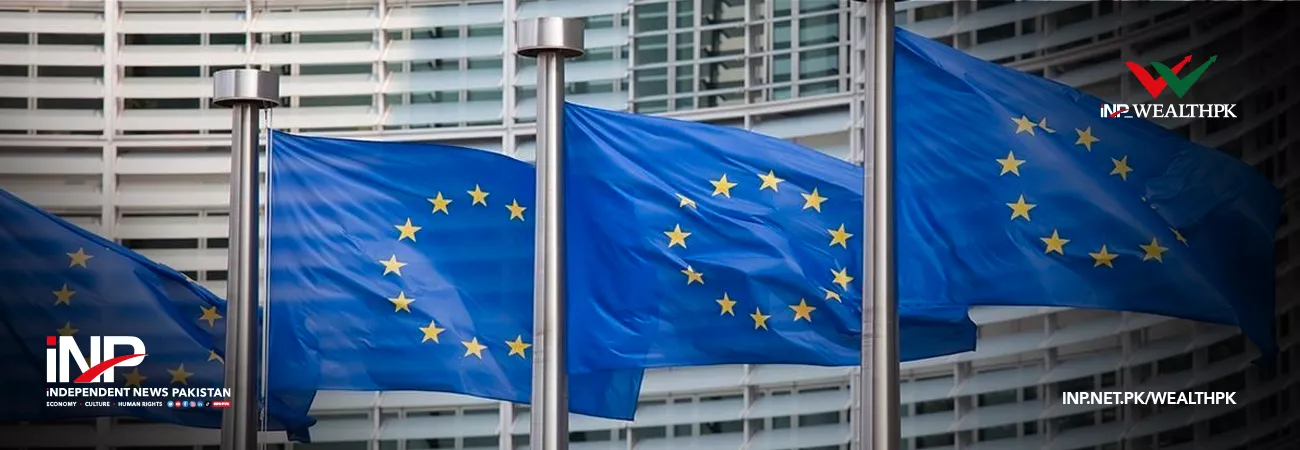INP-WealthPk
The European Union (EU) will provide Pakistan with 87 million euros to help the country boost green and equitable economic growth, increase access to clean energy, and improve skilled labour force. The initiatives are a component of the EU's assistance to Pakistan in the recovery and rebuilding phase following the floods, notably in Balochistan, Gilgit-Baltistan, and Khyber Pakhtunkhwa.
EU Ambassador Dr. Riina Kionka, and Ministry of Economic Affairs Secretary Dr. Kazim Niaz have signed agreements for three new development programmes that will receive 87 million euros in funding from the EU.The federal and provincial governments worked closely with the three programmes' designers to create them. The programmes are a part of the Team Europe Initiative's larger coordination efforts between the EU and its member states.
Additionally, they support the EU Global Gateway, a plan for advancing smart, secure, and reliable connections in the energy, transportation, and digital sectors, as well as for enhancing global health, education, and research systems.Economic Affairs and Development Secretary Dr. Kazim Niaz stated that the EU is Pakistan's most valued development partner because it has a sizable grant portfolio in the country and focuses particularly on the socioeconomic development of vulnerable communities.
Clean and green energy serves as the benchmark for all sustainable development, and support from the EU in this field is required to give Pakistan's efforts in this area the essential push, he said. Dr Kazim expressed the hope that these three financing agreements will further strengthen socioeconomic indicators because the transformation of the rural economy, the availability of inexpensive energy, and the provision of technical training to young people can all be extremely beneficial to underprivileged communities.
According to Ambassador Dr. Riina Kionka, Pakistan has a lot of potential due to its population and natural resources. The programmes signed today will assist in realising that promise by enabling Pakistanis to adopt sustainable agricultural practises, acquire the skills necessary for high-paying professions, and access clean and green energy, she said.
"Our support comes at a crucial moment, as people are still struggling with the effects of the terrible floods. We hope that the three programmes signed today contribute to economic recovery in the aftermath of the floods and make Pakistan stronger and more resilient," she added.
KP Rural Economic Transformation (KP-RET) (17 million euros) - The initiative supports farmers as they transition to more sustainable and lucrative agriculture, creates job opportunities, and has a special emphasis on adolescents and women in order to increase the income of rural households.
KP-RET is a component of a wider programme for agricultural development run by the government of Khyber-Pakhtunkhwa, and the EU investment will ensure that the programme's effects reach the most disadvantaged rural people.Energy Plus: Energy for Climate Resilience in Gilgit-Baltistan and the district of Chitral in Khyber Pakhtunkhwa (30 million euros) - A sustainable transition to renewable energy will be supported by the programme's creation of robust hydropower facilities and more effective energy utilisation.
Through a significant programme of tree planting, it will also aid in the management of natural resources in a more sustainable manner. It will improve the ability of the provincial government to make policies, with an emphasis on democratic planning, execution, and oversight in the energy and natural resource sectors.
EU support for sustainable economic development through demand-driven technical and vocational education and training (EUR40 million) - The initiative expands on the long-standing assistance provided by the EU to Pakistan's Technical and Vocational Education and Training (TVET) sector. In the agricultural, water, and energy sub-sectors, it will aim to provide appropriately skilled labour with an emphasis on environmentally friendly skills.
The initiative will improve the effectiveness of the country's TVET system and provide returning citizens and potential migrants with improved access to skills and job opportunities. A particular emphasis will be placed on expanding the pool of talented female workers in the high-tech and digital industries.
In order to support Pakistan's efforts to combat poverty, enhance education, promote good governance, uphold human rights and the rule of law, and guarantee sustainable use of natural resources, the EU gives Pakistan roughly €90 million a year in funds for development and cooperation. All of Pakistan is covered by the EU's collaboration, with a particular emphasis on Khyber Pakhtunkhwa, Gilgit-Baltistan, Balochistan, and Sindh.
Credit : Independent News Pakistan-WealthPk




